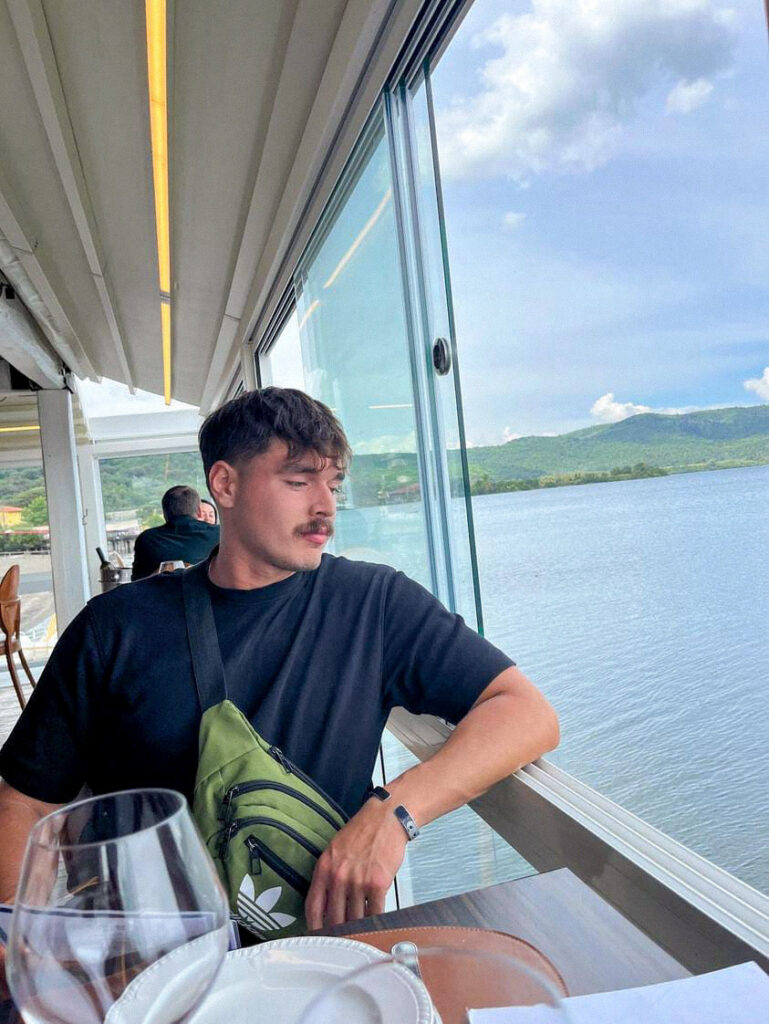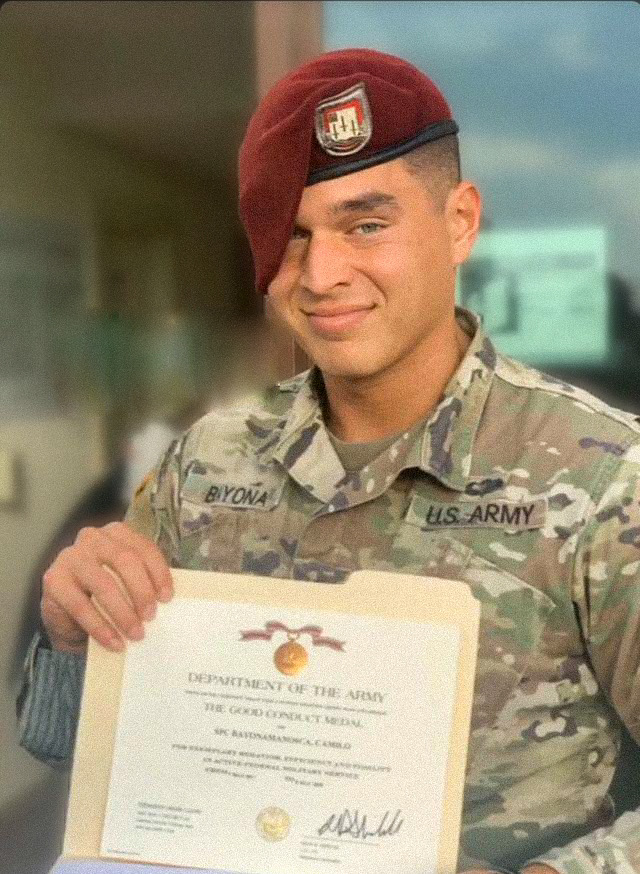Camilo Bayona-Mañosca is a Colombian-born, Canadian-raised U.S. Army Veteran who served in the 173rd Infantry Brigade Combat Team. He served an impressive term with notable achievements as an interpreter for NATO and Special Service missions and received two Army Achievement Medals, a Good Conduct Medal, and a National Defense Service Medal. Today, Camilo is studying his life-long passion for archaeology at the American University of Rome in Italy. As an esteemed polyglot, archaeology student, and soldier, Camilo is headed for a successful future centered around the deeply rooted values he shares in this interview.
Where were you born and where did you grow up?

I was born in Colombia, but I grew up in Quebec. Quebec is the eastern, French-speaking province in Canada. But then at the age of 15, I transferred to the United States with my family in Knoxville, Tennessee.
How would you say that your family kept your Colombian roots and culture alive?
If we talk about Colombian culture and roots, we can say that they kept it very much alive in general. Thinking of the minor memories I have of my childhood in Quebec and the people we had around, we kept it alive in terms of being around people who were of the same Colombian community. There is still a big Colombian community in Montreal. At the same time, it was avoided at some point linguistically. I grew up speaking mostly French, everything from friends, education, and daily life was in French. The only time that I truly spoke Spanish was either at home or maybe if we met up with extended family that lived in Ontario.
In the States, that pretty much disappeared in a sense because when we got to Tennessee, there was not really a Colombian community. In Knoxville, there were more Central Americans from Mexico to the Panama area. Those communities already have major differences in terms of culture. So that’s probably where the Colombian culture started to vanish. What really remained at that point were values, morals, or any form of behavior that was in the home. That’s where it truly remained, in the house. But in terms of cultural foods, dancing, or even getting together, that is where it kind of ended. Up to now, modern day, it’s picking back up at least for my family at the moment in that sense.
Is that the culture you feel most connected to?
In terms of family values and relationship structures, I would say so. I couldn’t say Quebec or the United States it’s the same thing. Everything else like music or food didn’t stick as much.
Thinking about your current Archaeology studies, were there traces of that interest in your childhood?
I can really give early evidence of this from childhood, probably very early on. A lot of children are interested in dinosaurs and I was one of those kids but extremely interested. I was gifted in remembering dinosaur names and anthropological documentaries involving dinosaurs and early humans. You can see it more in my early teenage years as well. During that time I discovered my love for any form of pre-Christian cultures and anything involving the Greeks. At the time it was just a lot of visual and memorization, I didn’t understand at the time that there was the Bronze Age. I didn’t understand there was even a time structure for any of these people. Later on, of course, I became interested in studying any form of the Bronze Age and phenotypes. That’s all a minor form of archaeology. So there has been that interest there for a long time, really a lifetime.
Who would you say from your upbringing had the most influence on who you are today?
I never heavily looked to be like someone, I always took parts and pieces of something I thought was good, useful, maybe a strong thing and took it upon myself to make that part of me. In terms of discipline and rigor, I would say my father. My father is a strong influence on who I am now. He was a military man, and therefore I became a military man. In general, my father was a tough man, but he always knew what he was doing.
Can you give an overview of your experience in the U.S. Army and why you decided to enlist?
I was in college at the time and didn’t want to do it all. Probably lost, you could say, at the time. But in the military and U.S. Army, there’s this thing called “a calling.” We call “the calling” pretty much a call to service, a call to duty. It doesn’t have to be up to the country, it can just be the call to duty. I went in, in 2017 for basic training and then when I graduated, I went into advanced school. From advanced school, I went into airborne school. Post-airborne school, I was in the States for a little bit, not much crazy stuff at that point. Then I was sent to Northern Italy and that was really where all the juice, I can say, of the military came in. I was PCS-ed, so transferred pretty much to the 173rd Infantry Brigade Combat Team and did a couple of duties there. At that time, we had a team where we needed to do any form of escort services, any form of movement, or even some kind of reconnaissance of any area. That was team-led, something that was always trained heavily and very physically rigorous in general.

I did a lot of interpretation as well because they saw I had a gift for multiple languages and of course, the French language. In the military, there is a test you can take called the DOPT, I believe it’s called the Defense Language Program Test, which qualifies you as knowing a language. I knew French very well, so I was put in a high classification for it. I was used as an interpreter for NATO training events or if we ever needed to interpret any mission with high-class people. I was sent to Normandy as well for a major remembrance event of D-Day. At the time, I worked with a lot of higher-up generals, one-star to four-star generals so in terms of interpreting, these were very professional conversations. Little rooms and round tapes, very professional for a young guy at the time. It was a very interesting situation having to interpret for a high-commander general with another high-commanding French general. At the time in 2019, Donald Trump was president and I worked with the Secret Service to interpret with doctors while he came to do a speech. Working with the Secret Service was really interesting.
I also worked as a mechanic with 60 kilowatts of 5-kilowatt generators. They were big generators that were responsible for when you’re deployed and having to do something in a completely isolated area to have power. This allows you to have power and to access any form of intelligence and anything like that. We worked with cryptological linguists, people who know foreign languages, they’re pretty much spies. They go on radio frequencies and they look over everything, very incredible people. So I worked with a lot of that and I also led a team of three guys.
What was the greatest lesson that you learned in the Army?
The extreme amounts of resilience, extreme amounts of strength, and being tough even in a bad situation. Long story short, I was medically discharged for epilepsy. I remember at the time I had a Sergeant who brought me to his desk because he heard about my diagnosis. He told me he heard about my medication situation and was sorry to hear all about that but to not give up. He said a lot of people don’t make it because they give up and surrender to their condition. He said regardless of anything, do not give up.
The military also teaches you a lot of leadership. Especially when you’re put in the team leader position, you have to know how to get under people’s skin in order to control a group. One thing I learned from one of my sergeants was that you cannot treat every one of your soldiers the same. Every single one has a different way of learning, a different way of listening and seeing.
What are your goals for your future career in archaeology?
I mean, to find Alexander the Great’s body. In general, I think that’d be very cool. But realistically I would like to study more continental Europe. I think it’s something that is understudied and when I mean continental Europe, I am talking about from Germany all the way to borderline Scandinavia. There is a lot of territory that hasn’t been searched since usually archaeologists are heavily invested in the Mediterranean. The main Mediterranean is Spain, Italy, Greece, the Balking, and North Africa. So that’s always the archaeologist’s main purpose, but I would like to push up a little more north and see what the Bronze Age was like there at the time. That’s the long term, but short term, study nearby in Italy or very likely Greece as well.
How do you think you will apply what you learned in the military to archaeology?
So if we’re talking in the long term, I would say everything aligns with archaeology. One, I will know how to man a team. Two, if your archaeologists are exposed to any hard conditions, whether rain or mud, that’s where the resilience of being in the military and exposure to rough conditions comes in. Even before the military, I was always exposed to rough weather in general. Also using technology, especially with generators will definitely help out.
My last question is what would be your advice for people to be brave and take a risk?
I am a man of God, a person for all. The biggest thing is to have guts for one. But also in my recommendation, definitely pray about it. Pray about it because in my theological thought, praying about it gives you a light and it gives you a kind of hand or wind that pushes you toward that direction. If you’re lost and know what you want to get, praying about it helps you with that. Maybe you do not believe in God in a sense, but praying about it can be a form of internal meditation that can help you come up with an idea or a solution for whatever you are trying to aim for. Also, just be resilient, and never give up. Be strong and courageous.
Connect with Camilo on LinkedIn
Honestus on Instagram
